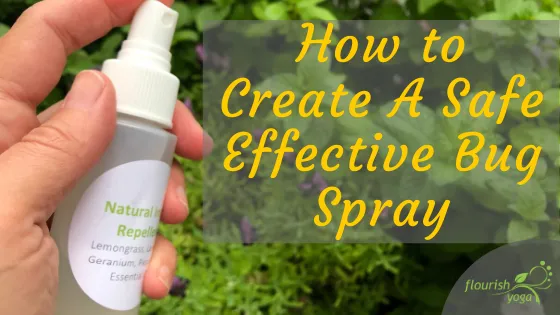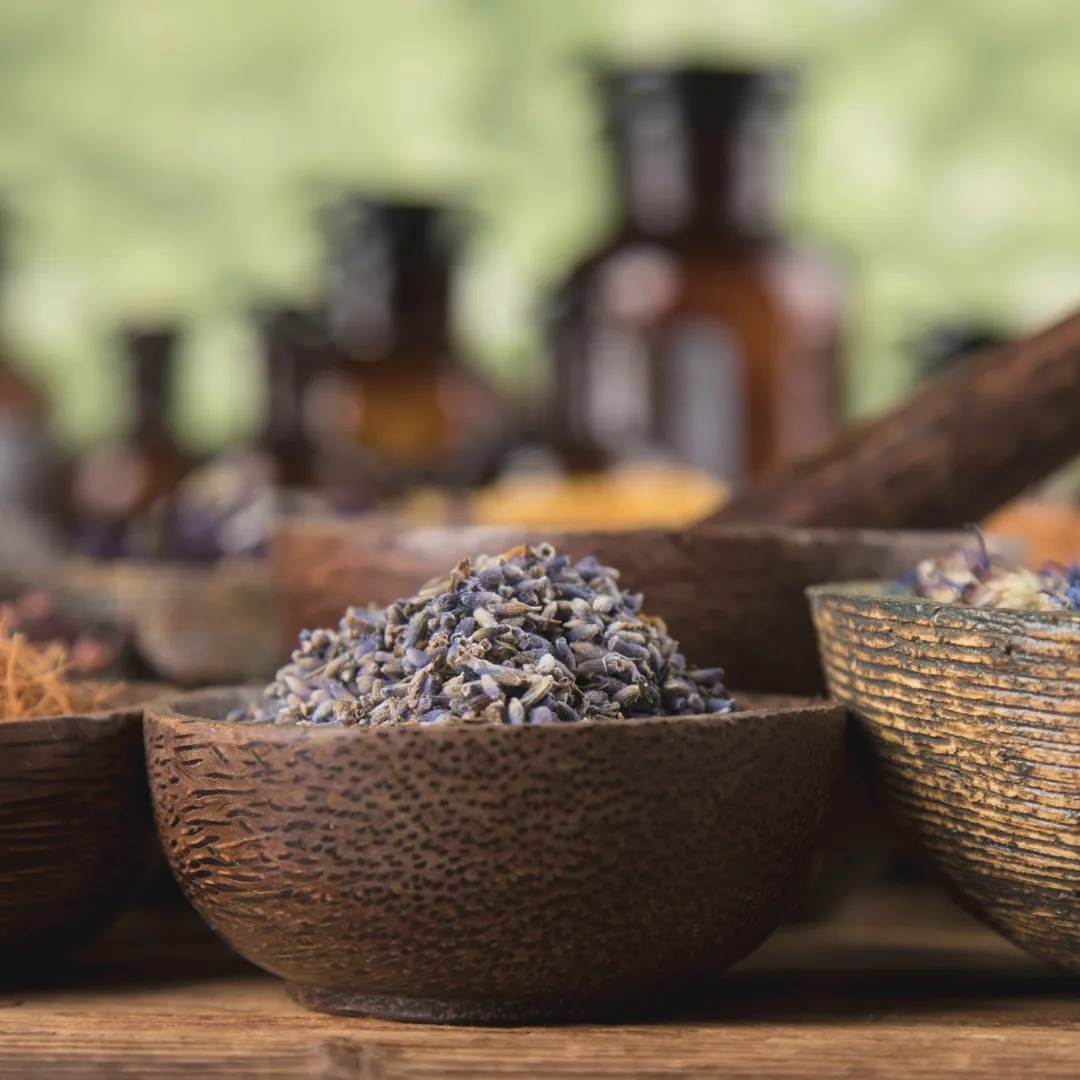Ayurvedic Tips & Essential Self Care Rituals

Learning is the heartbeat of the Flourish Community.
On the Flourish Blog you’ll find everything you need to live in tune with nature; Ayurvedic tips, yoga and essential oil classes, essential self care rituals, essential oil meditations and kids yoga and mindfulness activities where this all started.
Ayurvedic Tips

How to Create Your Own Safe and Effective Bug Spray
Create your own safe and effective bug spray – its a game changer for enjoying time outdoors without dousing yourself in toxic chemicals… kind of defeats the intention!
I grew up at the cabin in Northwestern Ontario that is a little slice of paradise, except for the bugs! There is a bug that will attack you for every month of summer. May is the little tiny black flies, June is wood-ticks, July is mosquitoes, August black flies… September is actually pretty pest free, but by then we were back in school.
Spending time outdoors is so essential for your health. Being active, exposure to sunshine and fresh air are critical to our well-being. With kids, the ability to play, fall, and learn resilience are all key factors in development.

The downside to outside play is the bugs some of which can carry disease. Somehow spraying myself, the kids and the dog with chemicals seems to counteract those health benefits. Insect repellents containing DEET being the only effective options available.
The test results of DEET are pretty scary;
• Inhibits Acetylcholinesterase (ACHE) growth. This is the enzyme that assists with the proper function of neurotransmitters. Dysregulation of ACHE production leads to nervous system diseases, nerve and muscle damage.
• Potential carcinogenic properties including accelerated tumour growth.
• Side effects including nausea, headaches, skin rashes, numb and burning lips, dizziness and reduced mental clarity.
The great news is that we now have quality essential oils that were not available when I was a kid, or even when my kids were small. And even better, you can create your own safe and effective bug spray in minutes.
Essential Oils are naturally derived from plants and their primary function is to repel insects away from the plant or tree. You can tap into this natural repellent to protect yourself and the bonus is that there are some really amazing side benefits too.
Plus as long as we use them responsibly the oils are safe for kids and pets too.
Essential Oils for Insect Repellent Research
The data on this gets quite technical here are the highlights and here are a couple of interesting articles to read to go into this further if you like all the technical jargon:
• Essential Oils as Repellents against Arthropods
• Plant-Based Insect Repellents: A Review of Their Efficacy, Development and Testing
• Insect Oil Repellents – A Short Review
Here are the top takeaways from these publications;
1. Many Essential Oils have repellent and insecticidal effects. A repellent is a substance that prevents or discourages insects from landing on and biting the skin. An insecticide is a substance known to kill insects, eggs or larvae.
2. Essential oils are the substance a plant produces to repel insects when released through bruising (contact) or released as a volatile chemical compound.
3. The main constituents of Essential Oils that are found to be repellent and insecticidal in nature are monoterpenes such as -pinene, cineole, eugenol, limonene, terpinolene, citronellol, citronellal, camphor and thymol.
4. Synthetic blends had much lower repellent effects than their corresponding natural Essential Oils.
5. The downside of using essential oils is thier volatile nature. They quickly evaporate and you need to re-apply every couple of hours. However, mixing essential oils with a base oil will prolong its effective properties.
6. Combining different essential oils provides higher repellency rates.
Effective Essential Oils for Repelling Insects
This is what many essential oils do really well. It’s what essential oils were designed to do. However, each plant has its own natural predators and comes from a different part of the world so this is where we start to play.
Finding the best recipe for your area and bug that are in season may require some testing. Here are the essential oils that are deemed most effective for mosquitoes and ticks in order of their potency. This may be different for you and your area so get playful. Many of the essential oils will repel both types of insects but are only listed once. Go with your gut and what’s in your oil cupboard as you create your blend.
To make this easier start with the base recipe below then add in other oils to increase the potency for your area and your personal “smell”.
A couple of notes of caution:
• Essential oils are not regulated so be careful of where you source your oils. Many essential oils contain synthetic additives which may be harmful and cause skin irritations.
• A few of the oils suggested below are known to be “hot oils” or oils that will cause skin irritations such as Oregano and Thyme. Only use these oils in a diluted form and use caution or additional dilution when using with kids and pets.

Best Essential Oils for Mosquitoes:
Lemon Eucalyptus:
Research has shown to be as effective or more so than DEET for repelling mosquitoes and other insects.
Arborvitae:
One of the top oil for repelling insects also provides natural sun protection.
Cinnamon:
Kills mosquito eggs and acts as a repellent to adult mosquitos. Cinnamon is a hot oil and needs to be diluted before applying to skin. Caution should be used with Cinnamon around pets.

Thyme:
Very effective against mosquitos, especially malarial mosquitos. Thyme is considered a hot oil and can cause skin irritation. Dilute before applying to the skin.
Fun Campfire Idea – throw thyme leaves into the fire to create your own airborne repellent (will last for 60 – 90 minutes)
Tea tree or Melaleuca:
Effective against mosquitoes, flies and midges. Also antiseptic and antimicrobial so will soothe the skin and prevent against infection from bites.
Oregano:
Effective insect repellent and boosts immune system response. Oregano is considered a hot oil and can cause skin irritation. Dilute before applying to the skin and use with caution for infants and pets.
Patchouli:
Effective insect repellent diffused and applied topically. Also great for skin and reducing anxiety.

Best Essential Oils for Ticks:
Cedarwood:
Toxic for ticks, but great for our skin. Calming and grounding oil for nerves and anxiety. Safe to use with pets.
Geranium:
Top oil for insect repellent and very safe to use. This oil can be applied directly to the skin. For dogs apply on their fur or put a couple of drops on their collar.
Peppermint:
Highly effective for ticks also reduces irritation and inflammation from bites.

Lemon Grass:
Effective repellent and soothes muscles and joints.
Lavender:
Tick deterrent and prevents tick eggs from hatching. Soothes skin from bite irritations.
Essential Oil Bug Spray Recipe
Using an oil base for your insect repellent helps lengthen the time it will be effective. The carrier oil is also great for your skin.
If, however, you do not wish your clothes or hands to be oily you can also use a mixture of water and witch hazel.

Natural Insect Repellent
10 drops each:
• lemongrass
• lavender
• geranium
• peppermint
• cedarwood
Fractionated Coconut Oil to fill 60 ml container
Mix essential oils in a small spray bottle, add fractionated coconut oil to fill. Shake well and spray on exposed areas of the skin.
*Can also use half and half water and witch hazel instead of the oil base.
*adapted from “The Essential Life”
The “Side Effects” of Essential Oils
Chemical bug repellents add to your daily toxic load and may cause detrimental long term effects. When you apply your essential oil lotion or spray you reap the other benefits of essential oils as side effects:
• Lower anxiety
• Less inflammation
• Boosts immune system
• Improves the appearance and skin elasticity
• Soothes sore muscles and joints
• Sun protection
With these side effects, you won’t mind reapplying every 1-2 hours. It will help everyone stay calm, focused and you will enjoy the day even more!
Best Essential Oils for Garden Pests Guide
Here are my top recommendations, tips and recipes to make your garden a toxic-free zone.
Ayurvedic Essential Oils

How to Create Your Own Safe and Effective Bug Spray
Create your own safe and effective bug spray – its a game changer for enjoying time outdoors without dousing yourself in toxic chemicals… kind of defeats the intention!
I grew up at the cabin in Northwestern Ontario that is a little slice of paradise, except for the bugs! There is a bug that will attack you for every month of summer. May is the little tiny black flies, June is wood-ticks, July is mosquitoes, August black flies… September is actually pretty pest free, but by then we were back in school.
Spending time outdoors is so essential for your health. Being active, exposure to sunshine and fresh air are critical to our well-being. With kids, the ability to play, fall, and learn resilience are all key factors in development.

The downside to outside play is the bugs some of which can carry disease. Somehow spraying myself, the kids and the dog with chemicals seems to counteract those health benefits. Insect repellents containing DEET being the only effective options available.
The test results of DEET are pretty scary;
• Inhibits Acetylcholinesterase (ACHE) growth. This is the enzyme that assists with the proper function of neurotransmitters. Dysregulation of ACHE production leads to nervous system diseases, nerve and muscle damage.
• Potential carcinogenic properties including accelerated tumour growth.
• Side effects including nausea, headaches, skin rashes, numb and burning lips, dizziness and reduced mental clarity.
The great news is that we now have quality essential oils that were not available when I was a kid, or even when my kids were small. And even better, you can create your own safe and effective bug spray in minutes.
Essential Oils are naturally derived from plants and their primary function is to repel insects away from the plant or tree. You can tap into this natural repellent to protect yourself and the bonus is that there are some really amazing side benefits too.
Plus as long as we use them responsibly the oils are safe for kids and pets too.
Essential Oils for Insect Repellent Research
The data on this gets quite technical here are the highlights and here are a couple of interesting articles to read to go into this further if you like all the technical jargon:
• Essential Oils as Repellents against Arthropods
• Plant-Based Insect Repellents: A Review of Their Efficacy, Development and Testing
• Insect Oil Repellents – A Short Review
Here are the top takeaways from these publications;
1. Many Essential Oils have repellent and insecticidal effects. A repellent is a substance that prevents or discourages insects from landing on and biting the skin. An insecticide is a substance known to kill insects, eggs or larvae.
2. Essential oils are the substance a plant produces to repel insects when released through bruising (contact) or released as a volatile chemical compound.
3. The main constituents of Essential Oils that are found to be repellent and insecticidal in nature are monoterpenes such as -pinene, cineole, eugenol, limonene, terpinolene, citronellol, citronellal, camphor and thymol.
4. Synthetic blends had much lower repellent effects than their corresponding natural Essential Oils.
5. The downside of using essential oils is thier volatile nature. They quickly evaporate and you need to re-apply every couple of hours. However, mixing essential oils with a base oil will prolong its effective properties.
6. Combining different essential oils provides higher repellency rates.
Effective Essential Oils for Repelling Insects
This is what many essential oils do really well. It’s what essential oils were designed to do. However, each plant has its own natural predators and comes from a different part of the world so this is where we start to play.
Finding the best recipe for your area and bug that are in season may require some testing. Here are the essential oils that are deemed most effective for mosquitoes and ticks in order of their potency. This may be different for you and your area so get playful. Many of the essential oils will repel both types of insects but are only listed once. Go with your gut and what’s in your oil cupboard as you create your blend.
To make this easier start with the base recipe below then add in other oils to increase the potency for your area and your personal “smell”.
A couple of notes of caution:
• Essential oils are not regulated so be careful of where you source your oils. Many essential oils contain synthetic additives which may be harmful and cause skin irritations.
• A few of the oils suggested below are known to be “hot oils” or oils that will cause skin irritations such as Oregano and Thyme. Only use these oils in a diluted form and use caution or additional dilution when using with kids and pets.

Best Essential Oils for Mosquitoes:
Lemon Eucalyptus:
Research has shown to be as effective or more so than DEET for repelling mosquitoes and other insects.
Arborvitae:
One of the top oil for repelling insects also provides natural sun protection.
Cinnamon:
Kills mosquito eggs and acts as a repellent to adult mosquitos. Cinnamon is a hot oil and needs to be diluted before applying to skin. Caution should be used with Cinnamon around pets.

Thyme:
Very effective against mosquitos, especially malarial mosquitos. Thyme is considered a hot oil and can cause skin irritation. Dilute before applying to the skin.
Fun Campfire Idea – throw thyme leaves into the fire to create your own airborne repellent (will last for 60 – 90 minutes)
Tea tree or Melaleuca:
Effective against mosquitoes, flies and midges. Also antiseptic and antimicrobial so will soothe the skin and prevent against infection from bites.
Oregano:
Effective insect repellent and boosts immune system response. Oregano is considered a hot oil and can cause skin irritation. Dilute before applying to the skin and use with caution for infants and pets.
Patchouli:
Effective insect repellent diffused and applied topically. Also great for skin and reducing anxiety.

Best Essential Oils for Ticks:
Cedarwood:
Toxic for ticks, but great for our skin. Calming and grounding oil for nerves and anxiety. Safe to use with pets.
Geranium:
Top oil for insect repellent and very safe to use. This oil can be applied directly to the skin. For dogs apply on their fur or put a couple of drops on their collar.
Peppermint:
Highly effective for ticks also reduces irritation and inflammation from bites.

Lemon Grass:
Effective repellent and soothes muscles and joints.
Lavender:
Tick deterrent and prevents tick eggs from hatching. Soothes skin from bite irritations.
Essential Oil Bug Spray Recipe
Using an oil base for your insect repellent helps lengthen the time it will be effective. The carrier oil is also great for your skin.
If, however, you do not wish your clothes or hands to be oily you can also use a mixture of water and witch hazel.

Natural Insect Repellent
10 drops each:
• lemongrass
• lavender
• geranium
• peppermint
• cedarwood
Fractionated Coconut Oil to fill 60 ml container
Mix essential oils in a small spray bottle, add fractionated coconut oil to fill. Shake well and spray on exposed areas of the skin.
*Can also use half and half water and witch hazel instead of the oil base.
*adapted from “The Essential Life”
The “Side Effects” of Essential Oils
Chemical bug repellents add to your daily toxic load and may cause detrimental long term effects. When you apply your essential oil lotion or spray you reap the other benefits of essential oils as side effects:
• Lower anxiety
• Less inflammation
• Boosts immune system
• Improves the appearance and skin elasticity
• Soothes sore muscles and joints
• Sun protection
With these side effects, you won’t mind reapplying every 1-2 hours. It will help everyone stay calm, focused and you will enjoy the day even more!
Best Essential Oils for Garden Pests Guide
Here are my top recommendations, tips and recipes to make your garden a toxic-free zone.
Yoga and Essential Oils

How to Create Your Own Safe and Effective Bug Spray
Create your own safe and effective bug spray – its a game changer for enjoying time outdoors without dousing yourself in toxic chemicals… kind of defeats the intention!
I grew up at the cabin in Northwestern Ontario that is a little slice of paradise, except for the bugs! There is a bug that will attack you for every month of summer. May is the little tiny black flies, June is wood-ticks, July is mosquitoes, August black flies… September is actually pretty pest free, but by then we were back in school.
Spending time outdoors is so essential for your health. Being active, exposure to sunshine and fresh air are critical to our well-being. With kids, the ability to play, fall, and learn resilience are all key factors in development.

The downside to outside play is the bugs some of which can carry disease. Somehow spraying myself, the kids and the dog with chemicals seems to counteract those health benefits. Insect repellents containing DEET being the only effective options available.
The test results of DEET are pretty scary;
• Inhibits Acetylcholinesterase (ACHE) growth. This is the enzyme that assists with the proper function of neurotransmitters. Dysregulation of ACHE production leads to nervous system diseases, nerve and muscle damage.
• Potential carcinogenic properties including accelerated tumour growth.
• Side effects including nausea, headaches, skin rashes, numb and burning lips, dizziness and reduced mental clarity.
The great news is that we now have quality essential oils that were not available when I was a kid, or even when my kids were small. And even better, you can create your own safe and effective bug spray in minutes.
Essential Oils are naturally derived from plants and their primary function is to repel insects away from the plant or tree. You can tap into this natural repellent to protect yourself and the bonus is that there are some really amazing side benefits too.
Plus as long as we use them responsibly the oils are safe for kids and pets too.
Essential Oils for Insect Repellent Research
The data on this gets quite technical here are the highlights and here are a couple of interesting articles to read to go into this further if you like all the technical jargon:
• Essential Oils as Repellents against Arthropods
• Plant-Based Insect Repellents: A Review of Their Efficacy, Development and Testing
• Insect Oil Repellents – A Short Review
Here are the top takeaways from these publications;
1. Many Essential Oils have repellent and insecticidal effects. A repellent is a substance that prevents or discourages insects from landing on and biting the skin. An insecticide is a substance known to kill insects, eggs or larvae.
2. Essential oils are the substance a plant produces to repel insects when released through bruising (contact) or released as a volatile chemical compound.
3. The main constituents of Essential Oils that are found to be repellent and insecticidal in nature are monoterpenes such as -pinene, cineole, eugenol, limonene, terpinolene, citronellol, citronellal, camphor and thymol.
4. Synthetic blends had much lower repellent effects than their corresponding natural Essential Oils.
5. The downside of using essential oils is thier volatile nature. They quickly evaporate and you need to re-apply every couple of hours. However, mixing essential oils with a base oil will prolong its effective properties.
6. Combining different essential oils provides higher repellency rates.
Effective Essential Oils for Repelling Insects
This is what many essential oils do really well. It’s what essential oils were designed to do. However, each plant has its own natural predators and comes from a different part of the world so this is where we start to play.
Finding the best recipe for your area and bug that are in season may require some testing. Here are the essential oils that are deemed most effective for mosquitoes and ticks in order of their potency. This may be different for you and your area so get playful. Many of the essential oils will repel both types of insects but are only listed once. Go with your gut and what’s in your oil cupboard as you create your blend.
To make this easier start with the base recipe below then add in other oils to increase the potency for your area and your personal “smell”.
A couple of notes of caution:
• Essential oils are not regulated so be careful of where you source your oils. Many essential oils contain synthetic additives which may be harmful and cause skin irritations.
• A few of the oils suggested below are known to be “hot oils” or oils that will cause skin irritations such as Oregano and Thyme. Only use these oils in a diluted form and use caution or additional dilution when using with kids and pets.

Best Essential Oils for Mosquitoes:
Lemon Eucalyptus:
Research has shown to be as effective or more so than DEET for repelling mosquitoes and other insects.
Arborvitae:
One of the top oil for repelling insects also provides natural sun protection.
Cinnamon:
Kills mosquito eggs and acts as a repellent to adult mosquitos. Cinnamon is a hot oil and needs to be diluted before applying to skin. Caution should be used with Cinnamon around pets.

Thyme:
Very effective against mosquitos, especially malarial mosquitos. Thyme is considered a hot oil and can cause skin irritation. Dilute before applying to the skin.
Fun Campfire Idea – throw thyme leaves into the fire to create your own airborne repellent (will last for 60 – 90 minutes)
Tea tree or Melaleuca:
Effective against mosquitoes, flies and midges. Also antiseptic and antimicrobial so will soothe the skin and prevent against infection from bites.
Oregano:
Effective insect repellent and boosts immune system response. Oregano is considered a hot oil and can cause skin irritation. Dilute before applying to the skin and use with caution for infants and pets.
Patchouli:
Effective insect repellent diffused and applied topically. Also great for skin and reducing anxiety.

Best Essential Oils for Ticks:
Cedarwood:
Toxic for ticks, but great for our skin. Calming and grounding oil for nerves and anxiety. Safe to use with pets.
Geranium:
Top oil for insect repellent and very safe to use. This oil can be applied directly to the skin. For dogs apply on their fur or put a couple of drops on their collar.
Peppermint:
Highly effective for ticks also reduces irritation and inflammation from bites.

Lemon Grass:
Effective repellent and soothes muscles and joints.
Lavender:
Tick deterrent and prevents tick eggs from hatching. Soothes skin from bite irritations.
Essential Oil Bug Spray Recipe
Using an oil base for your insect repellent helps lengthen the time it will be effective. The carrier oil is also great for your skin.
If, however, you do not wish your clothes or hands to be oily you can also use a mixture of water and witch hazel.

Natural Insect Repellent
10 drops each:
• lemongrass
• lavender
• geranium
• peppermint
• cedarwood
Fractionated Coconut Oil to fill 60 ml container
Mix essential oils in a small spray bottle, add fractionated coconut oil to fill. Shake well and spray on exposed areas of the skin.
*Can also use half and half water and witch hazel instead of the oil base.
*adapted from “The Essential Life”
The “Side Effects” of Essential Oils
Chemical bug repellents add to your daily toxic load and may cause detrimental long term effects. When you apply your essential oil lotion or spray you reap the other benefits of essential oils as side effects:
• Lower anxiety
• Less inflammation
• Boosts immune system
• Improves the appearance and skin elasticity
• Soothes sore muscles and joints
• Sun protection
With these side effects, you won’t mind reapplying every 1-2 hours. It will help everyone stay calm, focused and you will enjoy the day even more!
Best Essential Oils for Garden Pests Guide
Here are my top recommendations, tips and recipes to make your garden a toxic-free zone.
Essential Oil Meditations

How to Create Your Own Safe and Effective Bug Spray
Create your own safe and effective bug spray – its a game changer for enjoying time outdoors without dousing yourself in toxic chemicals… kind of defeats the intention!
I grew up at the cabin in Northwestern Ontario that is a little slice of paradise, except for the bugs! There is a bug that will attack you for every month of summer. May is the little tiny black flies, June is wood-ticks, July is mosquitoes, August black flies… September is actually pretty pest free, but by then we were back in school.
Spending time outdoors is so essential for your health. Being active, exposure to sunshine and fresh air are critical to our well-being. With kids, the ability to play, fall, and learn resilience are all key factors in development.

The downside to outside play is the bugs some of which can carry disease. Somehow spraying myself, the kids and the dog with chemicals seems to counteract those health benefits. Insect repellents containing DEET being the only effective options available.
The test results of DEET are pretty scary;
• Inhibits Acetylcholinesterase (ACHE) growth. This is the enzyme that assists with the proper function of neurotransmitters. Dysregulation of ACHE production leads to nervous system diseases, nerve and muscle damage.
• Potential carcinogenic properties including accelerated tumour growth.
• Side effects including nausea, headaches, skin rashes, numb and burning lips, dizziness and reduced mental clarity.
The great news is that we now have quality essential oils that were not available when I was a kid, or even when my kids were small. And even better, you can create your own safe and effective bug spray in minutes.
Essential Oils are naturally derived from plants and their primary function is to repel insects away from the plant or tree. You can tap into this natural repellent to protect yourself and the bonus is that there are some really amazing side benefits too.
Plus as long as we use them responsibly the oils are safe for kids and pets too.
Essential Oils for Insect Repellent Research
The data on this gets quite technical here are the highlights and here are a couple of interesting articles to read to go into this further if you like all the technical jargon:
• Essential Oils as Repellents against Arthropods
• Plant-Based Insect Repellents: A Review of Their Efficacy, Development and Testing
• Insect Oil Repellents – A Short Review
Here are the top takeaways from these publications;
1. Many Essential Oils have repellent and insecticidal effects. A repellent is a substance that prevents or discourages insects from landing on and biting the skin. An insecticide is a substance known to kill insects, eggs or larvae.
2. Essential oils are the substance a plant produces to repel insects when released through bruising (contact) or released as a volatile chemical compound.
3. The main constituents of Essential Oils that are found to be repellent and insecticidal in nature are monoterpenes such as -pinene, cineole, eugenol, limonene, terpinolene, citronellol, citronellal, camphor and thymol.
4. Synthetic blends had much lower repellent effects than their corresponding natural Essential Oils.
5. The downside of using essential oils is thier volatile nature. They quickly evaporate and you need to re-apply every couple of hours. However, mixing essential oils with a base oil will prolong its effective properties.
6. Combining different essential oils provides higher repellency rates.
Effective Essential Oils for Repelling Insects
This is what many essential oils do really well. It’s what essential oils were designed to do. However, each plant has its own natural predators and comes from a different part of the world so this is where we start to play.
Finding the best recipe for your area and bug that are in season may require some testing. Here are the essential oils that are deemed most effective for mosquitoes and ticks in order of their potency. This may be different for you and your area so get playful. Many of the essential oils will repel both types of insects but are only listed once. Go with your gut and what’s in your oil cupboard as you create your blend.
To make this easier start with the base recipe below then add in other oils to increase the potency for your area and your personal “smell”.
A couple of notes of caution:
• Essential oils are not regulated so be careful of where you source your oils. Many essential oils contain synthetic additives which may be harmful and cause skin irritations.
• A few of the oils suggested below are known to be “hot oils” or oils that will cause skin irritations such as Oregano and Thyme. Only use these oils in a diluted form and use caution or additional dilution when using with kids and pets.

Best Essential Oils for Mosquitoes:
Lemon Eucalyptus:
Research has shown to be as effective or more so than DEET for repelling mosquitoes and other insects.
Arborvitae:
One of the top oil for repelling insects also provides natural sun protection.
Cinnamon:
Kills mosquito eggs and acts as a repellent to adult mosquitos. Cinnamon is a hot oil and needs to be diluted before applying to skin. Caution should be used with Cinnamon around pets.

Thyme:
Very effective against mosquitos, especially malarial mosquitos. Thyme is considered a hot oil and can cause skin irritation. Dilute before applying to the skin.
Fun Campfire Idea – throw thyme leaves into the fire to create your own airborne repellent (will last for 60 – 90 minutes)
Tea tree or Melaleuca:
Effective against mosquitoes, flies and midges. Also antiseptic and antimicrobial so will soothe the skin and prevent against infection from bites.
Oregano:
Effective insect repellent and boosts immune system response. Oregano is considered a hot oil and can cause skin irritation. Dilute before applying to the skin and use with caution for infants and pets.
Patchouli:
Effective insect repellent diffused and applied topically. Also great for skin and reducing anxiety.

Best Essential Oils for Ticks:
Cedarwood:
Toxic for ticks, but great for our skin. Calming and grounding oil for nerves and anxiety. Safe to use with pets.
Geranium:
Top oil for insect repellent and very safe to use. This oil can be applied directly to the skin. For dogs apply on their fur or put a couple of drops on their collar.
Peppermint:
Highly effective for ticks also reduces irritation and inflammation from bites.

Lemon Grass:
Effective repellent and soothes muscles and joints.
Lavender:
Tick deterrent and prevents tick eggs from hatching. Soothes skin from bite irritations.
Essential Oil Bug Spray Recipe
Using an oil base for your insect repellent helps lengthen the time it will be effective. The carrier oil is also great for your skin.
If, however, you do not wish your clothes or hands to be oily you can also use a mixture of water and witch hazel.

Natural Insect Repellent
10 drops each:
• lemongrass
• lavender
• geranium
• peppermint
• cedarwood
Fractionated Coconut Oil to fill 60 ml container
Mix essential oils in a small spray bottle, add fractionated coconut oil to fill. Shake well and spray on exposed areas of the skin.
*Can also use half and half water and witch hazel instead of the oil base.
*adapted from “The Essential Life”
The “Side Effects” of Essential Oils
Chemical bug repellents add to your daily toxic load and may cause detrimental long term effects. When you apply your essential oil lotion or spray you reap the other benefits of essential oils as side effects:
• Lower anxiety
• Less inflammation
• Boosts immune system
• Improves the appearance and skin elasticity
• Soothes sore muscles and joints
• Sun protection
With these side effects, you won’t mind reapplying every 1-2 hours. It will help everyone stay calm, focused and you will enjoy the day even more!
Best Essential Oils for Garden Pests Guide
Here are my top recommendations, tips and recipes to make your garden a toxic-free zone.
Kids Yoga Activities

How to Create Your Own Safe and Effective Bug Spray
Create your own safe and effective bug spray – its a game changer for enjoying time outdoors without dousing yourself in toxic chemicals… kind of defeats the intention!
I grew up at the cabin in Northwestern Ontario that is a little slice of paradise, except for the bugs! There is a bug that will attack you for every month of summer. May is the little tiny black flies, June is wood-ticks, July is mosquitoes, August black flies… September is actually pretty pest free, but by then we were back in school.
Spending time outdoors is so essential for your health. Being active, exposure to sunshine and fresh air are critical to our well-being. With kids, the ability to play, fall, and learn resilience are all key factors in development.

The downside to outside play is the bugs some of which can carry disease. Somehow spraying myself, the kids and the dog with chemicals seems to counteract those health benefits. Insect repellents containing DEET being the only effective options available.
The test results of DEET are pretty scary;
• Inhibits Acetylcholinesterase (ACHE) growth. This is the enzyme that assists with the proper function of neurotransmitters. Dysregulation of ACHE production leads to nervous system diseases, nerve and muscle damage.
• Potential carcinogenic properties including accelerated tumour growth.
• Side effects including nausea, headaches, skin rashes, numb and burning lips, dizziness and reduced mental clarity.
The great news is that we now have quality essential oils that were not available when I was a kid, or even when my kids were small. And even better, you can create your own safe and effective bug spray in minutes.
Essential Oils are naturally derived from plants and their primary function is to repel insects away from the plant or tree. You can tap into this natural repellent to protect yourself and the bonus is that there are some really amazing side benefits too.
Plus as long as we use them responsibly the oils are safe for kids and pets too.
Essential Oils for Insect Repellent Research
The data on this gets quite technical here are the highlights and here are a couple of interesting articles to read to go into this further if you like all the technical jargon:
• Essential Oils as Repellents against Arthropods
• Plant-Based Insect Repellents: A Review of Their Efficacy, Development and Testing
• Insect Oil Repellents – A Short Review
Here are the top takeaways from these publications;
1. Many Essential Oils have repellent and insecticidal effects. A repellent is a substance that prevents or discourages insects from landing on and biting the skin. An insecticide is a substance known to kill insects, eggs or larvae.
2. Essential oils are the substance a plant produces to repel insects when released through bruising (contact) or released as a volatile chemical compound.
3. The main constituents of Essential Oils that are found to be repellent and insecticidal in nature are monoterpenes such as -pinene, cineole, eugenol, limonene, terpinolene, citronellol, citronellal, camphor and thymol.
4. Synthetic blends had much lower repellent effects than their corresponding natural Essential Oils.
5. The downside of using essential oils is thier volatile nature. They quickly evaporate and you need to re-apply every couple of hours. However, mixing essential oils with a base oil will prolong its effective properties.
6. Combining different essential oils provides higher repellency rates.
Effective Essential Oils for Repelling Insects
This is what many essential oils do really well. It’s what essential oils were designed to do. However, each plant has its own natural predators and comes from a different part of the world so this is where we start to play.
Finding the best recipe for your area and bug that are in season may require some testing. Here are the essential oils that are deemed most effective for mosquitoes and ticks in order of their potency. This may be different for you and your area so get playful. Many of the essential oils will repel both types of insects but are only listed once. Go with your gut and what’s in your oil cupboard as you create your blend.
To make this easier start with the base recipe below then add in other oils to increase the potency for your area and your personal “smell”.
A couple of notes of caution:
• Essential oils are not regulated so be careful of where you source your oils. Many essential oils contain synthetic additives which may be harmful and cause skin irritations.
• A few of the oils suggested below are known to be “hot oils” or oils that will cause skin irritations such as Oregano and Thyme. Only use these oils in a diluted form and use caution or additional dilution when using with kids and pets.

Best Essential Oils for Mosquitoes:
Lemon Eucalyptus:
Research has shown to be as effective or more so than DEET for repelling mosquitoes and other insects.
Arborvitae:
One of the top oil for repelling insects also provides natural sun protection.
Cinnamon:
Kills mosquito eggs and acts as a repellent to adult mosquitos. Cinnamon is a hot oil and needs to be diluted before applying to skin. Caution should be used with Cinnamon around pets.

Thyme:
Very effective against mosquitos, especially malarial mosquitos. Thyme is considered a hot oil and can cause skin irritation. Dilute before applying to the skin.
Fun Campfire Idea – throw thyme leaves into the fire to create your own airborne repellent (will last for 60 – 90 minutes)
Tea tree or Melaleuca:
Effective against mosquitoes, flies and midges. Also antiseptic and antimicrobial so will soothe the skin and prevent against infection from bites.
Oregano:
Effective insect repellent and boosts immune system response. Oregano is considered a hot oil and can cause skin irritation. Dilute before applying to the skin and use with caution for infants and pets.
Patchouli:
Effective insect repellent diffused and applied topically. Also great for skin and reducing anxiety.

Best Essential Oils for Ticks:
Cedarwood:
Toxic for ticks, but great for our skin. Calming and grounding oil for nerves and anxiety. Safe to use with pets.
Geranium:
Top oil for insect repellent and very safe to use. This oil can be applied directly to the skin. For dogs apply on their fur or put a couple of drops on their collar.
Peppermint:
Highly effective for ticks also reduces irritation and inflammation from bites.

Lemon Grass:
Effective repellent and soothes muscles and joints.
Lavender:
Tick deterrent and prevents tick eggs from hatching. Soothes skin from bite irritations.
Essential Oil Bug Spray Recipe
Using an oil base for your insect repellent helps lengthen the time it will be effective. The carrier oil is also great for your skin.
If, however, you do not wish your clothes or hands to be oily you can also use a mixture of water and witch hazel.

Natural Insect Repellent
10 drops each:
• lemongrass
• lavender
• geranium
• peppermint
• cedarwood
Fractionated Coconut Oil to fill 60 ml container
Mix essential oils in a small spray bottle, add fractionated coconut oil to fill. Shake well and spray on exposed areas of the skin.
*Can also use half and half water and witch hazel instead of the oil base.
*adapted from “The Essential Life”
The “Side Effects” of Essential Oils
Chemical bug repellents add to your daily toxic load and may cause detrimental long term effects. When you apply your essential oil lotion or spray you reap the other benefits of essential oils as side effects:
• Lower anxiety
• Less inflammation
• Boosts immune system
• Improves the appearance and skin elasticity
• Soothes sore muscles and joints
• Sun protection
With these side effects, you won’t mind reapplying every 1-2 hours. It will help everyone stay calm, focused and you will enjoy the day even more!
Best Essential Oils for Garden Pests Guide
Here are my top recommendations, tips and recipes to make your garden a toxic-free zone.
What's the Next Best Step for YOU?
Here’s how to start loving and looking after you.
Rebuilding your energy step by step.

Discover Your Dosha!
When you know your nature everything becomes… well… second nature.
From what foods you can eat guilt-free…
Which essential oils will calm your type of stress…
How to best look after your skin…
Exercise hacks and motivators…
To finding your peaceful centre so you can respond instead of react.
Uncovering your unique yoga personality will help you sort through all the self-help advice and know what’s effective for you.
Let's get started.






